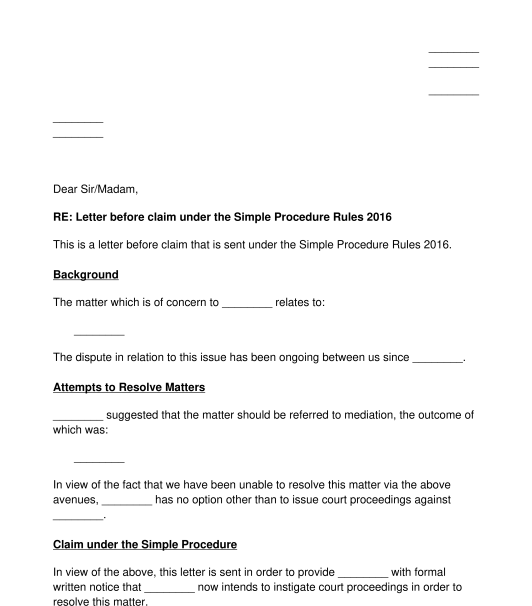 02/11/2025
02/11/2025

Answer a few questions and your document is created automatically.

Your document is ready! You will receive it in Word and PDF formats. You will be able to modify it.

 02/11/2025
02/11/2025
 Word and PDF
Word and PDF
 1 page
1 page
A letter of intention to start the Simple Procedure, is a letter before action/claim. It can be used by an individual or a business to notify another party that they intend to initiate a claim at Court using the Simple Procedure in Scotland.
A different kind of letter before claim can be used in England and Wales.
A letter of complaint is a more informal letter. Usually, it will invite the recipient to resolve matters informally and the letter will not make detailed reference to any potential future claim, in the way that a letter before action does.
A letter before action will serve as a final warning and will provide one final opportunity for the recipient to resolve matters. This kind of letter will include particular information about the future claim. It will provide a specific deadline within which court proceedings will be issued, in the absence of any resolution.
No. It is however best practice to do so, to illustrate to the Court that all steps have been taken to resolve matters before issuing a claim.
The Simple Procedure is a court process that is designed to resolve small disputes. The value of the claim of any sum of money should be £5000 or less for a claim under the Simple Procedure.
Further information about the Simple Procedure is available on the Scottish Courts website.
Once the letter has been completed with all the relevant information and signed, it should be sent to the other party. It may be printed, signed and posted to the other party. It may be helpful to have the letter sent by recorded/tracked delivery. It is also acceptable to send the letter electronically via email. It may be helpful in this instance to request a read receipt on the letter.
The other party will be provided with a timeframe within which they must respond to the letter. Where no response is received, or where no satisfactory solution is reached, the claim may be issued.
The sender may wish to include any relevant evidence to support their future claim. This will help to explain the basis of their claim. Evidence may include:
The letter should contain concise details about the claim. The letter should always include the following key information:
The specific laws that will govern the case will depend upon the nature of the intended claim.
The key legal provisions that are relevant to the Simple Procedure are:
The potential claimant should also consider any time limits which may apply to their claim:
The Prescription and Limitation (Scotland) Act 1973
You fill out a form. The document is created before your eyes as you respond to the questions.
At the end, you receive it in Word and PDF formats. You can modify it and reuse it.
A guide to help you: How to Send a Letter
Letter of Intention to Start Simple Procedure
Country: United Kingdom